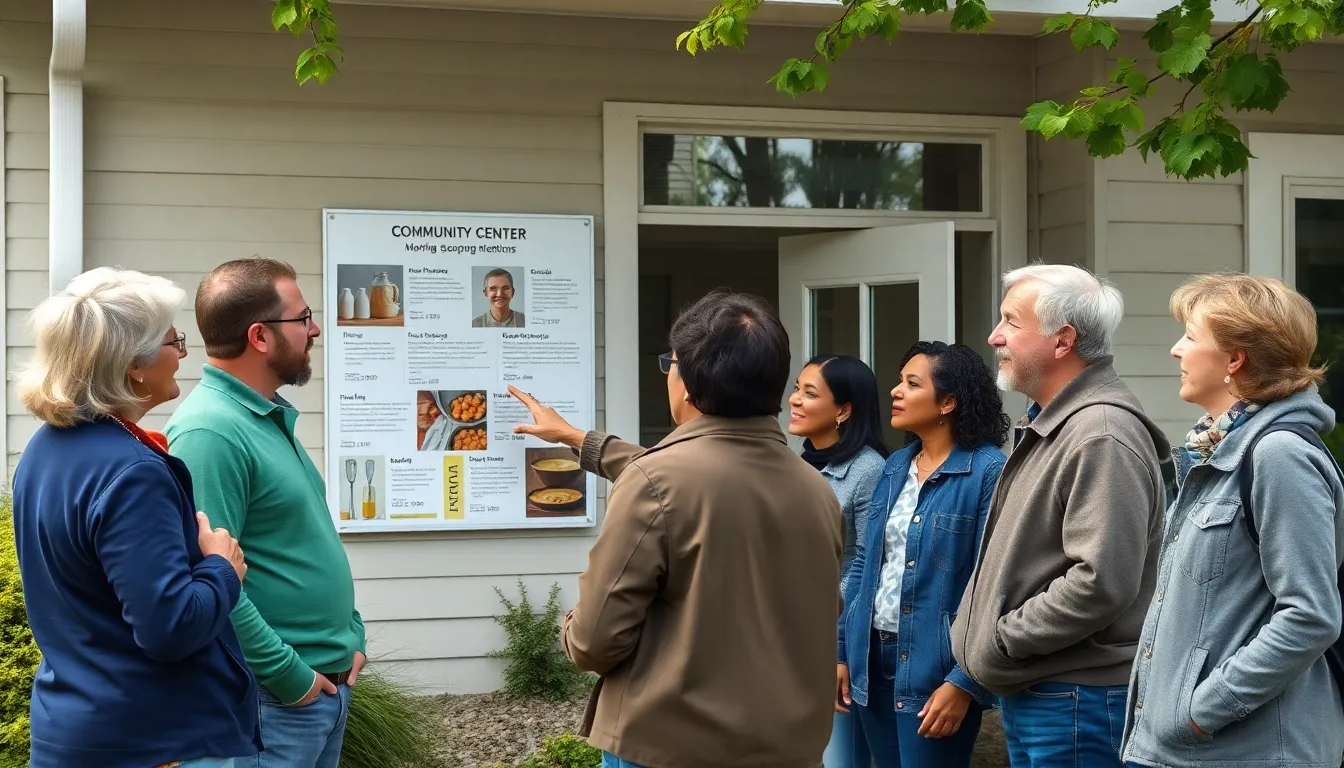When hunger strikes and the fridge looks emptier than a politician’s promise, soup kitchens can be a lifesaver. These community gems serve up warm bowls of goodness, nourishing both the body and soul. Whether you’re a regular or just curious, finding a soup kitchen nearby can turn a gloomy day into a hearty feast.
Imagine stepping into a cozy space filled with the aroma of simmering broth and friendly faces. It’s not just about the food; it’s about connection, compassion, and maybe even a few laughs. So, if you’re on the hunt for a warm meal or simply want to lend a hand, discovering “soup kitchens near me” can lead to more than just a meal—it can lead to a community experience that fills more than just your stomach.
Table of Contents
ToggleUnderstanding Soup Kitchens
Soup kitchens serve as essential resources within communities. Typically, they provide hot meals to individuals and families facing food insecurity. Many operate with the support of volunteers and donations, ensuring that everyone receives nourishment regardless of their circumstances.
Various organizations run these kitchens, including non-profits and religious groups. Some focus on specific populations, such as the homeless or seniors. Others welcome anyone who needs a meal.
The atmosphere in soup kitchens often promotes a sense of belonging. Patrons can interact with one another, share experiences, and build relationships. Many kitchens also offer additional services, such as job training and healthcare resources, creating a comprehensive support system.
Hours of operation may vary, with some open daily and others operating on select days. Many locations provide meals during lunch or dinner hours, but schedules can differ by site. To find local soup kitchens, individuals can utilize online resources or community centers for information.
Soup kitchens not only fulfill immediate nutritional needs but also create a community space. They represent compassion and solidarity within neighborhoods, reminding everyone of the importance of helping those in need. Local residents and organizations often collaborate to sustain these vital services, demonstrating collective responsibility.
Finding Soup Kitchens Near Me

Locating soup kitchens in a nearby area is straightforward and essential for those seeking assistance. Utilizing various resources can greatly simplify the process.
Online Resources
Many websites list soup kitchens based on location. Local food banks often provide updated information. Websites like Feed America and Community Soup Kitchens can help individuals find specific details about operating hours and meal services. Google Maps can reveal nearby kitchens and offer directions. Social media platforms frequently share posts about local soup kitchens, making them easy to find. Searching for terms like “soup kitchens near me” can yield comprehensive results, displaying ratings and reviews from patrons.
Local Community Centers
Community centers frequently serve as valuable hubs for finding food assistance. They often maintain lists of local resources, including soup kitchens. Outreach programs at these centers may sponsor events that promote kitchen services. Asking staff at local churches or non-profits can also yield helpful information. Additionally, bulletin boards in community spaces may feature announcements about nearby soup kitchens and their schedules. Networking with other community members can reveal lesser-known options, increasing the chances of finding a nearby kitchen that meets specific needs.
Benefits of Soup Kitchens
Soup kitchens offer critical benefits that extend beyond just serving food. They play a fundamental role in addressing hunger while fostering community connections.
Nourishment and Support
Nutrition remains a priority at soup kitchens. Many kitchens provide balanced meals, helping to combat food insecurity among vulnerable populations. Patrons appreciate the variety in nutritious offerings, which often include fresh vegetables, proteins, and grains. Support extends beyond meals; many soup kitchens also connect individuals to resources like job training programs and health services, forming a comprehensive safety net. This combination of nourishment and tailored support empowers individuals to improve their circumstances and enhance overall well-being.
Community Engagement
Engagement thrives in the welcoming environment of soup kitchens. Individuals often share stories and experiences, building friendships that strengthen community ties. Regular patrons frequently foster a sense of belonging, which is vital for mental and emotional health. Volunteers also benefit from the interaction, gaining insights into the challenges faced by others. By hosting events and activities, many soup kitchens encourage wider community participation, creating opportunities for collaboration and understanding, ultimately reinforcing solidarity within neighborhoods.
How to Volunteer at Soup Kitchens
Volunteering at soup kitchens offers a rewarding experience while supporting the community. Many individuals find fulfillment in contributing their time and skills to this vital resource.
Requirements and Commitments
Several soup kitchens require volunteers to apply in advance. Applications may include a background check, especially for those working directly with vulnerable populations. Commitments typically vary, with some kitchens asking for a few hours each week while others need support on specific days. Volunteers often assist in meal preparation, serving food, and cleaning up after meals. Flexibility is essential as scheduling changes may arise. Prior experience in cooking or food services can be helpful, but kitchens frequently welcome first-time volunteers eager to learn.
Making a Difference
Volunteering creates tangible impacts on individuals and families facing food insecurity. Each meal served represents not only sustenance but also compassion and community support. Many volunteers experience personal growth, gaining insights into the struggles of others. Engaging with the local community fosters solidarity and connection. Creating relationships with patrons enhances the overall experience, making both volunteers and guests feel valued. Participation in special events or fundraisers can further amplify the difference a volunteer makes in addressing hunger. Each action contributes to a larger mission of providing hope and encouragement.
Finding a local soup kitchen can be a transformative experience for those in need. These kitchens not only provide nourishing meals but also create a welcoming space for connection and support. Engaging with these community resources fosters compassion and solidarity among individuals facing food insecurity.
By seeking out soup kitchens nearby, individuals can access vital services and build relationships that enhance their well-being. Whether through sharing a meal or volunteering time, everyone can contribute to this essential network of support. Soup kitchens play a crucial role in addressing hunger while promoting a sense of belonging in the community.



